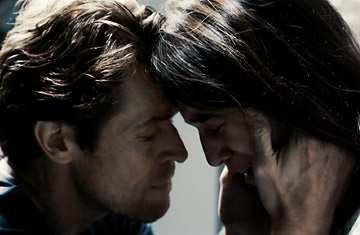
Willem Dafoe and Charlotte Gainsbourg in a still from "Antichrist"
(2 of 2)
A month later, She (Gainsbourg) is still hospitalized with grief, while He (Dafoe) tries all his trade's tricks to ease her back to mental health. Returning home doesn't help; She is haunted by the child's room, his playthings, his absence. Already, though, an attentive viewer wonders if the parents set the wrong tone for their son, since, on a table by the playpen, they've placed three metal statuettes labeled Pain, Grief and Despair. These figures will recur, in the forms of a deer, a fox and a crow, as the woman's grip on sanity loosens and she becomes a danger to herself and her husband.
The first half of Antichrist has enough storytelling vigor and sheen convince any critic, including those who thought von Trier went off the rails with his Dogville and Manderlay epics, that, hey, the guy can make a normal movie, and with the highest skill. There are visions here worth savoring, pure von Trier weirdo-magic, like the sight of Gainsbourg lying on the forest ground, willing herself to blend with the green. Through simple grace notes — photos from the previous summer of the boy's shoes put on the wrong feet, and, in one of several allusions to The Shining, a thesis notebook whose pages reveal handwriting that grows less coherent and into scrawls — the director deftly drops hints of madness in its early bloom. The woman is driven bonkers by grief at her son's death, but she may have been heading for the daft side months before it.
For much of the film, the tone of the two main characters are more or less believable repositories of toxic sadness and perplexed good will. Dafoe's calming, wooing voice (he could rake the Gabriel Byrne role as the sympathetic shrink on HBO's In Treatment) has an effect on everyone but Gainsbourg. The actress's performance will be called daring, because of the sexual intensity in her trysts with Dafoe and a long, nude masturbation scene in the forest. But she's an acute judge of the woman's character in the subtler moments as well. Her face, which resembles the woodcut of an ancient warrior, can express all the stark shades of desperation the script requires.
It's when Antichrist moves defiantly out of the land of Hitchcock's Psycho and into Saw territory that it lost most of its audience Sunday night. There were scenes — the woman's attack on her husband's sex organs, then her mutilation of her own — where you could hear "Oh, come on!" muttered in several languages. There's nothing wrong with a movie going crazy along with its characters, as we noted in our Thirst review two days ago, but von Trier doesn't have the craft to bring the moviegoer along in the most extreme parts of Antichrist. The thought was that we were being subject to the spectacle, not of a woman going mad, but of a director.
Von Trier means to portray the woman's dangerous identity with the witches who were the subject of her thesis, and to argue that nature itself may be evil. ("Nature," the woman says, "is Satan's church.") What troubles even von Trier partisans is the connection this woman has with some of his other female protagonists. Emily Watson in Breaking the Waves, Bjork in Dancer in the Dark, Nicole Kidman in Dogville and Bryce Dallas Howard in Manderlay are all made to endure, at the rough hands of men, indignations that are depicted so long and lovingly that they seem like exploitation. In the Romer interview, von Trier insists that "calling me a misogynist is wrong... I don't think women or their sexuality is evil, but it is frightening." And his view of women is Manichean: they are saints or whores, victims of the most vicious brutality or, as here, perpetrators.
Then again, you never know how serious von Trier is. He created the super-austere Dogme 95 style of filmmaking, which was copied by many even as he outgrew and denounced it. His last picture, The Boss of It All, was a comedy with a sour taste, so you can't be sure that Antichrist is as dead-serious as it appears. Maybe the movie is a big deadpan joke, an antic-hrist. What's certain is that serious film people on several continents will be talking about von Trier's latest affront, defending or deriding it, finding it hard to ignore. Short of an flat-out masterpiece, what more can movies offer?
